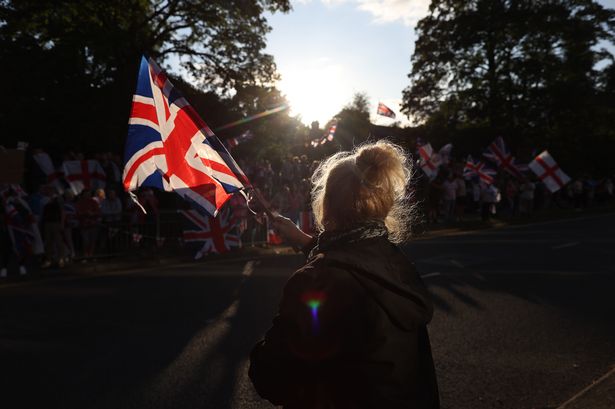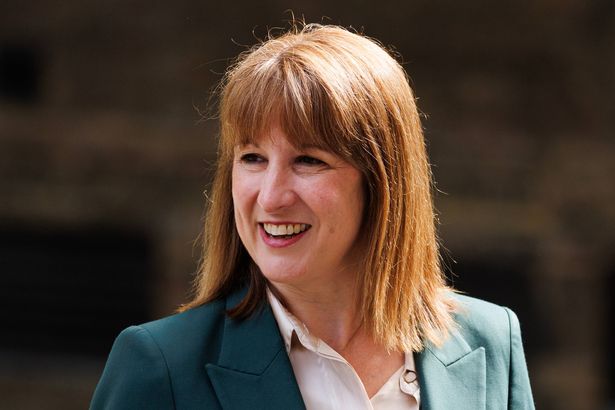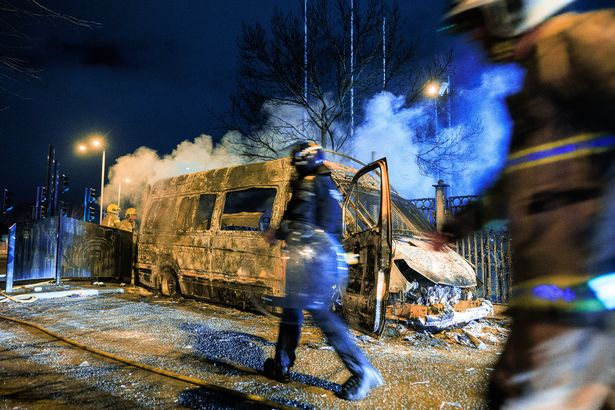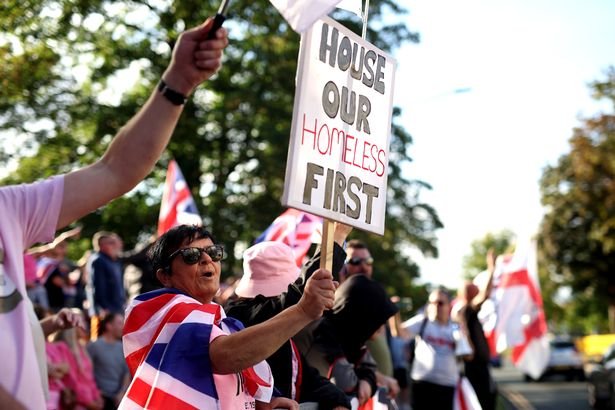SPECIAL REPORT: As protests continue outside hotels housing people seeking asylum in our region, the Manchester Evening News looks at how we ended up in this situation, what the government is planning to do about it and where asylum seekers will go when the hotels are closed. Protests have taken place outside hotels housing asylum seekers across the country this summer(Image: Manchester Evening News)
Protests have taken place outside hotels housing asylum seekers across the country this summer(Image: Manchester Evening News)
It was during the pandemic, shortly before she took over as leader of Manchester council, that Bev Craig first became aware of the plans to use hotels as asylum seeker accommodation. Five of them would be set up in the city – but the town hall was in the dark.
“We’re not even talking about permission,” the Labour leader says, “We’re talking about telling. We didn’t find out until they arrived, and we obviously had to stand up a lot of support.”
Years later, when a hotel in Newton Heath became the latest to house asylum seekers, some of that support came in the form of donating shoes to the new residents who had arrived barefoot. In response, local councillors collected shoes to donate to them.
Sign up to the MEN Politics newsletter Due North here
That same hotel would become a target in the riots that followed the Southport attack last summer when a mob gathered outside.
Other councils in Greater Manchester have also complained of receiving little or no notice when hotels were set up in their areas. However, Serco, which runs asylum seeker housing in the North West, says that it always consults with the relevant local authority.
Hotels housing asylum seekers have been at the centre of tensions over migration again this summer, with some protests turning ugly.
 Anti-migrant protesters have gathered outside an asylum seeker hotel in Fallowfield in recent weeks(Image: Ryan Jenkinson)
Anti-migrant protesters have gathered outside an asylum seeker hotel in Fallowfield in recent weeks(Image: Ryan Jenkinson)
It comes as the government promised to stop using hotels by the end of this Parliament after Labour had previously promised to do it within a year. Meanwhile, some councils are considering legal action to get hotels shut faster, following the lead of a council in Essex.
As protests continue outside hotels housing people seeking asylum in our region, the Manchester Evening News looks at how we ended up in this situation, what the government is planning to do about it and where asylum seekers will go when hotels are finally closed.
The backlog
For much of the last two decades, the number of people claiming asylum in the UK remained below 40,000 a year, only just exceeding this threshold during the European migration crisis in 2015 and 2016, and again in 2019, just before the pandemic.
The number of decisions made on asylum claims, most of which are approved, had also stayed fairly stable in recent years.
That was until 2020 when the Covid lockdown saw the number of asylum decisions plummet as the process was effectively paused.
Meanwhile, as the world emerged from the pandemic, the number of asylum applications began to skyrocket, reaching record highs.
The Home Office has been criticised for allowing this backlog of asylum claims to build up, with many linking this to the use of hotels.
Among them is Greater Manchester Immigration Aid Unit (GMIAU), an organisation which offers support to people seeking asylum.
 Chancellor Rachel Reeves has promised to end the use of hotels as asylum seeker accommodation by the end of this Parliament(Image: Dan Kitwood, Getty Images)
Chancellor Rachel Reeves has promised to end the use of hotels as asylum seeker accommodation by the end of this Parliament(Image: Dan Kitwood, Getty Images)
“The large-scale use of hotels came about because Home Office decision-making stalled during the pandemic and a backlog built up,” a spokesperson for GMIAU said. “After the pandemic, the Home Office continued to fail to make decisions on cases throughout 2022.
“And then the last government introduced further delays through the Illegal Migration Act in 2023, which effectively barred most people seeking sanctuary from claiming asylum.”
Several sources told the Manchester Evening News that the number of asylum seekers who required housing while their claims were being processed had become so high because of this backlog that there was a ‘supply issue’ when it came to accommodation, leading to the use of hotels.
When there is not enough housing, the Home Office – which has a legal obligation to provide accommodation to asylum seekers who would otherwise be destitute – can move people to alternatives such as hotels and other large sites, like former military bases.
Private companies are contracted to procure and manage accommodation, with Serco holding the contract for the North West.
Once an asylum claim is approved, councils become responsible for housing those who are evicted from Home Office accommodation.
 Manchester council leader Bev Craig(Image: ABNM Photography)
Manchester council leader Bev Craig(Image: ABNM Photography)
According to Coun Craig, using hotels to house asylum seekers was a ‘mistake’ all along. The GMIAU agrees, pointing out that hotels are ‘hyper visible’ and in the public eye, making the prospect of these hotels becoming the centre of protests ‘highly predictable’.
What are the hotels like?
By the end of June this year, there were 32,059 asylum seekers living in hotels across the UK, an increase of 8 per cent compared to the year before, but down significantly from the peak of 56,042 at the end of September 2023 when the Conservatives were in power.
When they were in power, the Conservatives promised to clear the backlog and end the costly use of hotels. Since summer 2023, the number of hotels housing asylum seekers has reduced dramatically from more than 400, costing around £9m a day, to fewer than 210.
According to the Home Office, the cost of running these hotels fell to £5.77m per day in 2024/25, down from £8.3m per day in 2023/24.
Private companies, like Serco who are given contracts to run accommodation for asylum seekers, provide housing, food and security.
Any other services offered to hotel residents, such as English lessons, are either provided by charities or commissioned by councils.
Asylum seekers living in hotels are typically offered three meals a day as well as a weekly allowance of £9.95 a week per person.
 Counter-protesters have been attending demonstrations to show solidarity with refugees
Counter-protesters have been attending demonstrations to show solidarity with refugees
Those who are living in accommodation where food it not provided receive £49.18 a week. They have no legal right to work.
According to GMIAU, the quality of the food provided at asylum hotels varies, but in some cases it is ‘low quality’ with ‘no choice’.
The organisation also claims that staff at these hotels are often ‘poorly trained’, with Serco accused of running things ‘on the cheap’.
Serco says it provides regular, balanced meals of which there is a choice depending on food intolerances, allergies and religious beliefs. The staff working at these hotels are not necessarily employed by Serco and may be employed by the hotels themselves.
“Looking at the kinds of hotels that they’re placed in,” Coun Craig says, “we can joke – and we see jokes in the media – that they’re all in four star, they’re all in this, they’re all in that.
“The Fallowfield one is a case in point. Nobody that’s coming on a weekend to Manchester would book that hotel.
“These are cheap hotels that have been procured and I think that tells you all you need.”
Why are people protesting? A burnt out police van outside the Suites Hotel in Knowsley in February 2023(Image: Joel Goodman/LNP)
A burnt out police van outside the Suites Hotel in Knowsley in February 2023(Image: Joel Goodman/LNP)
In February 2023, violence broke out outside the Suites Hotel in Knowsley, Merseyside which had been housing asylum seekers.
The following year, eight men were sentenced to over 18 years for their involvement in the violent disorder which saw a large group gather outside the hotel before a police van was set on fire and rocks were thrown at officers facilitating an ‘initially peaceful protest’.
Unfortunately, it was a sign of things to come. Last summer, several hotels housing asylum seekers across the country were targeted.
In Newton Heath, missiles were thrown towards an asylum hotel as well as at police, while a bus was attacked and its driver injured.
Days later in Rotherham, several men attacked a hotel housing 400 people seeking asylum with some attempting to set it on fire.
Protests that have taken place outside asylum hotels more recently have been relatively peaceful, although some have been arrested.
 Riot police were attacked outside an asylum seeker hotel in Newton Heath last summer
Riot police were attacked outside an asylum seeker hotel in Newton Heath last summer
This includes the protesters arrested last week outside a hotel in Fallowfield which is being used as asylum seeker accommodation.
Four men – most of whom live elsewhere in Greater Manchester – have now been charged with a variety of offences relating to the incident, including indecent exposure; assaulting an emergency worker; racially aggravated harassment; and theft of a police hat.
According to Coun Craig, intelligence from GMP suggests that the people organising these protests were not local to the area.
However, protests elsewhere in Greater Manchester have attracted local residents, some of whom have enthusiastically joined in.
Last month, the Manchester Evening News spoke to protesters outside Cresta Court in Altrincham which has been housing asylum seekers since last year.
These protesters, many of whom lived nearby, expressed concerns about crime, pressure on public services and costs to the taxpayer.
Some spoke of an increase in crime and anti-social behaviour linked to the hotel, but police say that this is not reflected in the data.
Meanwhile, counter-protesters from Stand Up to Racism, who frequently attend these demonstrations to show solidarity with asylum seekers, say refugees are not to blame for cuts to public services, arguing that it is irresponsible for people to protest outside hotels.
 Protests have been taking place regularly outside Cresta Court in Altrincham(Image: Manchester Evening News)
Protests have been taking place regularly outside Cresta Court in Altrincham(Image: Manchester Evening News)
“We saw last summer, when people came out and demonstrated outside hotels, it wasn’t just a riot,” says Nahella Ashraf, co-chair of the group’s Greater Manchester branch. “In some cases they tried to set fire to buildings which are housing refugees.”
GMIAU says that the people living in the hotels are, of course, feeling scared. However, in the face of adversity, some remain positive.
“People are also talking about the positives and the welcome they have in communities and the sense that protests are not what Britain is about,” a spokesperson for GMIAU said.
“We’ve been contacted by a lot of people in the community who want to send a message of positivity,” Coun Craig added.
“People that want to do something positive and community-led organisations are looking at what they can positively do to support people in hotels from a voluntary and community sector perspective but even a neighbourhood lunch.”
“I think it’s been difficult to see,” she said, reflecting on the recent protests in Fallowfield and across Greater Manchester.
“But I think, in some ways, it’s been inevitable. I’ve been pleased that it’s not been more widespread.”
What happens next?
The government has pledged to end the use of hotels as asylum accommodation by the end of this Parliament – 2029 at the latest.
For this plan to work, asylum claims must be processed fast enough so that fewer people need to be housed at any one time.
Those who have their application approved are often housed by the local council in the area where they receive the decision – unless they can afford to rent privately – while asylum seekers who have their claims rejected will no longer have a right to remain in the UK.
 Shabana Mahmood has recently been appointed Home Secretary(Image: James Manning/PA Wire)
Shabana Mahmood has recently been appointed Home Secretary(Image: James Manning/PA Wire)
The number of decisions made on asylum applications has increased since the Labour government came to power last year.
However, according to GMIAU, the ‘rushed process’ means that many are being wrongly rejected and appealing these decisions.
“Although the Home Office has sped up decision making, the rushed process is affecting the quality of decision making, meaning that many are being wrongly refused asylum,” a spokesperson for GMIAU said.
“This means that the ‘backlog’ has effectively been transferred to the courts system – and people still need to be housed while awaiting their appeal.
“The government’s efforts to speed up the appeals system does not address the root cause of the problem, which is poor decision making by the Home Office.”
“The way to reduce hotel use would be to make high-quality decisions in a timely manner, so that people seeking sanctuary can get on with their lives and settle in our communities,” the spokesperson added.
So where will asylum seekers be housed if hotels are no longer used as accommodation? With fewer people waiting for a decision, the hope is that asylum seekers could be housed in family homes or house of multiple occupation, as they historically have been.
However, the government has also spoken about using military and industrial sites, instead of hotels, as temporary accommodation.
The most important thing for local leaders in Greater Manchester though, is that the distribution of asylum seekers becomes fairer.
 Manchester council leader Bev Craig(Image: ABNM Photography)
Manchester council leader Bev Craig(Image: ABNM Photography)
“If you want this to be equitable,” Coun Craig says, “if you want this to be country-wide, then you need to look at where private companies are making their profit and actually having a bit more of a fairness in how things are distributed.”
Historically, more asylum seekers have been housed in places like Greater Manchester where housing is relatively cheap. But as housing costs in the city increase, this has been happening less in the last couple of years, according to Coun Craig.
The Manchester council leader argues that companies like Serco have been one of the drivers ‘distorting’ the housing market.
However, she is keen not to conflate the social housing crisis that the city has long faced with the issues in the asylum system.
“Every time I’ve built council homes,” she says, “and post it on my socials, people post comments saying, ‘well, nobody from Manchester will get it, it’s not for us, it’s for someone else’.
“Actually, you just have to look at Newton Heath – Silk Street, the council housing there – we had a local lettings policy for people who lived in the area who would get priority, either on the homeless register or right-sizing near that accommodation.
“The council housing that we’re opening this week in Collyhurst, that’s people from Collyhurst getting in.
“It doesn’t matter what colour you are, it doesn’t matter what background, it’s where you’re from.
“I think it’s just in this climate, it’s so important to stress that.”
What the government says
A Home Office spokesperson said: “The government inherited a broken asylum system, with tens of thousands stuck in hotels and costs reaching £9 million a day.
“Over the past year, we have doubled decision-making rates and cut nearly £1 billion in hotel spending. We aim to close all asylum hotels by the end of this Parliament, working with local authorities to ensure balanced and sustainable accommodation.”
